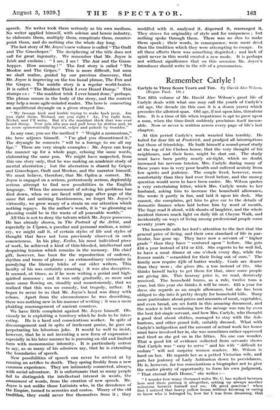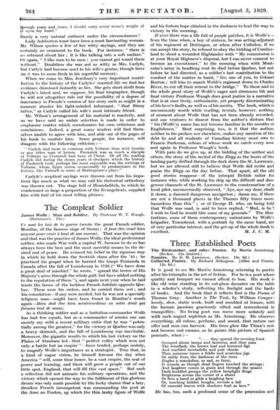Remember Carlyle !
Carlyle to Three Score Years and Ten. By David Alec Wilson. (Regan Paul. 18s.) THE fifth volume of Mr. David Alec Wilson's great life of
Carlyle deals with what one may call the youth of Carlyle's old age, the decade (in this case it is a dozen years) which precedes the allotted span. Old age, if not upon him, threatens him. It is a time of life when impatience is apt to grow upon a man, when the time-limit suddenly proclaims itself inexor- able. Now or never is written across every page of life's last chapter.
At this period Carlyle's work wearied him terribly. He toiled for dear life at Frederick, and grudged all interruptions but those of friendship. He built himself a sound-proof study at the top of his Chelsea house, that the very thought of his neighbours, and their hens, might be shut out. The study must have been pretty nearly air-tight, which no doubt increased his nervous tension. Mrs. Carlyle during many of these years was in very poor health and suffered acutely from low spirits and jealousy. The couple lived, however, more comfortably than they had ever lived before, and the money question would seem to have been easier. Mr. Wilson quotes a very entertaining letter, which Mrs. Carlyle wrote to her husband, asking him to increase the household allowance. She wrote it partly in fun, and laid it upon his desk. She cannot, she complains, get him to give ear to the details of domestic finance when laid before him by word of mouth.
The Sage read it aloud, with shouts of laughter, and the whole incident throws much light on daily life at Cheyne Walk, and incidentally on ways of living among professional people some seventy years ago.
The housewife calls her lord's attention to the fact that the general price of living, and their own standard of life in par- ticular, has gone up. They have now a servant of " higher' grade " than they have " ventured upon " before. She gets £16 a year instead of £12 or £13. She expects to be well fed, to have a meat dinner at one o'clock every day, while the former maids " scrambled for their living out of ours." The family now require 2ilb of butter weekly. Coals are dearer than they were ; she gives 26s. a ton instead of 21s. She thinks herself lucky to get them for that, since some people are giving 50s. This hearsay price is, we read, derisively
received. The household burns, as a rule, twelve tons a year, but this year she thinks it will be more. £25 a year for dress she regards as an ample allowance, but she has been obliged to dip into it pretty deeply for household bills. Many more particulars about prices and amounts of meat, vegetables, and even bread, are set forth in this amusing document, and the reader is left wondering how the menage was run by even the best fed single servant, and how Mrs. Carlyle, who thought a good deal about clothes, managed to stay with the Ash- burtons, and other grand folk, suitably dressed. What with
Carlyle's indigestion and the amount of actual work her house must have involved her in, she was sometimes rather oppressed and tired as she got on in the fifties. No one can wonder. That a good bit of evidence collected from servants shows that Carlyle was " easy to serve " and his wife " difficult to endure " will not surprise women readers. Mr. Wilson is hard on her. He regards her as a petted Victorian wife, and puts her jealousy of Lady Ashburton down to peevishness. He is, however, far too conscientious a biographer not to give the reader plenty of opportunity to form his own judgment. " That eternal Bath House," she writes :-
" I wonder how many thousand miles Mr. C. has walked between here and there putting it altogether, setting up always another milestone betwixt himself and me. Oh good gracious ! when first I noticed that heavy yellow house without knowing or caring to know who it belonged to, how far I was from dreaming, that trough years and years, I should carry every stone's weight of it upon fey heart."
Surely a very natural outburst under the circumstances ! Lad Ashburton must have been a most fascinating woman.
Mr. Wilson quotes a few of her witty sayings, and they are
certainly an ornament to the book. For instance, " there is no rebound about her ; it is like talking into a soft surface."
Or again, " I like men to be men ; you cannot get round them without." Doubtless she was not as witty as Mrs. Carlyle, but Carlyle had become used to his wife's genius, though later
on it was to seem fresh in his regretful memory.
When we come to Miss Jewsbury's very important contri- bution to the history of the Carlyles' married life we find her evidence dismissed instantly as lies. She gets short shrift from Carlyle's latest and, we suppose, his final biographer, though he will not altogether rule out the possibility of a degree of inaccuracy in Froude's version of her story such as might in a measure absolve his light-minded informant, " that flimsy tatter," as Carlyle called his wife's most intimate friend.
Mr. Wilson's arrangement of his material is masterly, and as we have said no unfair selection is made in order to emphasize matter which corroborates his own criticisms and conclusions. Indeed, a great many readers will find them- selves unable to agree with him, and able out of the pages of his book to confute him. Some people, for instance, will disagree with the following criticism :-
"Carlyle had more in common with Voltaire than with Goethe or any other man of letters. Frederick was as much a disciple of Voltaire as Cromwell had been of Christ. Of all tho readmg Carlyle did during the dozen years of drudgery which the history of Frederick took, perhaps the most enjoyable was the writings of Voltaire, whose figure seems occasionally to predominate in the history, like Falstaff in some of Shakespeare's plays."
Carlyle's sceptical sayings were thrown out from his impa- tient lips much as what we may call his rhetorical orthodoxy was thrown out. The stage hell of Houndsditch, to which he condemned so large a proportion of the Evangelicals, supplied him with half of his most telling phrases.



































 Previous page
Previous page